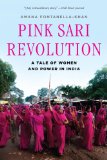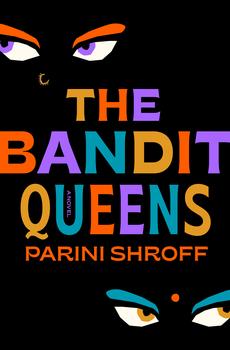Summary | Excerpt | Reviews | Beyond the book | Read-Alikes | Genres & Themes | Author Bio

Critics' Opinion:
Readers' Opinion:
First Published:
Aug 2013, 304 pages
Paperback:
Aug 2014, 304 pages
 Book Reviewed by:
Book Reviewed by:
Kim Kovacs
Buy This Book
In Pink Sari Revolution, journalist Amana Fontanella-Khan describes the creation of India's Gulabi ("Pink") Gang, a group of pink sari-wearing women in the northern state of Uttar Pradesh who band together to fight injustice in the state; and their charismatic founder and leader, Sampat Pal Devi. The book expands on the author's 2010 article in Slate magazine to paint a more complete picture of conditions in this part of India and the challenges faced by the women of the region.
Much of the book covers the life of the incredible Sampat Pal Devi, an assertive woman in her late 40s capable of inciting a crowd to action with her extraordinary rhetorical skills. It's remarkable that she rose to such fame, as the environment in which she was raised should have perpetuated the cycle of poverty and acceptance of discrimination she now fights against. Kairi, Sampat Pal's hometown is described as:
…a place where injustice against women, the lower castes and the poor was an accepted part of life. The cries of a woman being beaten by a drunk husband in the middle of the night; a Dalit denied participation in village celebrations for fear that he and his family, considered 'untouchable', would 'pollute' the community metal thaali plates heaped with biryani; girls married off to widowed, older men who would use them like maids: these occurrences were, for the most part, accepted as being 'how things were.' Parents, grandparents and cousins – everyone – had stoically born life's injustices without so much as a wince. If you could not, there was little hope for survival.
Sampat always had an outgoing and rebellious nature, however, and could be counted on to stand up for the underdog from an early age. In one of her childhood adventures she took revenge against a girl from a wealthy family – who had slapped a shepherd boy for using the landlord's field as a toilet - by leading a group of neighborhood children to defecate en masse on the family's land. After her marriage (at age 12) she continued to be obstreperous, eventually angering her mother-in-law over a deliberate and unapologetic violation of the caste system to the point that she tried to have Sampat killed. Sampat's crime was to have accepted a glass of water from a lower caste woman.
 The start of the Gulabi gang as a unit can be traced to 2006, when Sampat organized about two dozen women to protest the lack of progress in getting a local road repaired. Realizing how effective a group of people banded together could be, Sampat concluded that the women needed greater visibility and a uniform of sorts to give them more cohesion and recognition, and so decided the group's members would wear pink saris (pink, because it was a color that didn't represent an existing group). The press subsequently gave them the name "Gulabi Gang." Now over 20,000 members strong, the group's influence has spread across much of north India.
The start of the Gulabi gang as a unit can be traced to 2006, when Sampat organized about two dozen women to protest the lack of progress in getting a local road repaired. Realizing how effective a group of people banded together could be, Sampat concluded that the women needed greater visibility and a uniform of sorts to give them more cohesion and recognition, and so decided the group's members would wear pink saris (pink, because it was a color that didn't represent an existing group). The press subsequently gave them the name "Gulabi Gang." Now over 20,000 members strong, the group's influence has spread across much of north India.
It's not surprising that a grassroots organization such as the Gulabi Gang arose in Uttar Pradesh, India's most populous state with just under 200 million inhabitants. According to the author, corruption is rampant; more than a quarter of the state's 403 elected representatives in the Legislative Assembly had been charged with criminal offenses at the time the book was written, with nineteen percent of them charged with serious crimes including attempted murder, rape, extortion and kidnapping. Police salaries are very low (sometimes less than what a street sweeper would earn) and it's widely accepted that their only means of really making a living is through bribery and extortion. The area is home to some of the "country's most notorious bandits, who often take the law into their own hands after not receiving justice. Many murder their enemies and then spend a lifetime looting villages to provide for themselves while on the run." As a result, Fontanella-Khan continues, "Vast swathes of Uttar Pradesh are widely considered, even by the government, to be 'lawless.'"
The women of the state are generally penniless, and consequently have little legal recourse. If they are raped or beaten, often the male involved merely pays a bribe to have the case dismissed. Sampat and her group of women look for cases such as these and seek redress, often using unconventional methods. Sheer force of numbers is often enough to intimidate law enforcement into doing the right thing. The women might mob a police station for example, singing loudly and demanding justice. The sea of pink always attracts crowds of citizens and journalists, and the subsequent publicity frequently encourages a closer look into the facts of a case. In other instances, they may threaten an abusive husband with the pink-painted bamboo lathis (see 'Beyond the Book') they carry, letting him know they will beat him up if he doesn't change his ways (they've been known to follow through with the threat).
Fontanella-Khan's admiration for Sampat Pal Devi and the Gulabi Gang is obvious throughout this well-written and entertaining book. While one might question whether the vigilante justice employed by this group is a valid means of addressing discrimination and corruption in Uttar Pradesh, it is clear that many feel it is doing vital work. Pink Sari Revolution is a must-read for anyone seeking to know more about women's lives in north India or for those who are curious about Sampat Pal Devi and the Gulabi Gang.
Picture of Sampat Pal Devi from Indianexpress.com
![]() This review was originally published in The BookBrowse Review in November 2013, and has been updated for the
September 2014 edition.
Click here to go to this issue.
This review was originally published in The BookBrowse Review in November 2013, and has been updated for the
September 2014 edition.
Click here to go to this issue.

If you liked Pink Sari Revolution, try these:

by Parini Shroff
Published 2024
A young Indian woman finds the false rumors that she killed her husband surprisingly useful—until other women in the village start asking for her help getting rid of their own husbands—in this razor-sharp debut.

by Thrity Umrigar
Published 2022
A Reese's Book Club Pick! In this riveting and immersive novel, bestselling author Thrity Umrigar tells the story of two couples and the sometimes dangerous and heartbreaking challenges of love across a cultural divide.





The Flower Sisters
by Michelle Collins Anderson
From the new Fannie Flagg of the Ozarks, a richly-woven story of family, forgiveness, and reinvention.

The House on Biscayne Bay
by Chanel Cleeton
As death stalks a gothic mansion in Miami, the lives of two women intertwine as the past and present collide.

The Funeral Cryer by Wenyan Lu
Debut novelist Wenyan Lu brings us this witty yet profound story about one woman's midlife reawakening in contemporary rural China.
Your guide toexceptional books
BookBrowse seeks out and recommends the best in contemporary fiction and nonfiction—books that not only engage and entertain but also deepen our understanding of ourselves and the world around us.